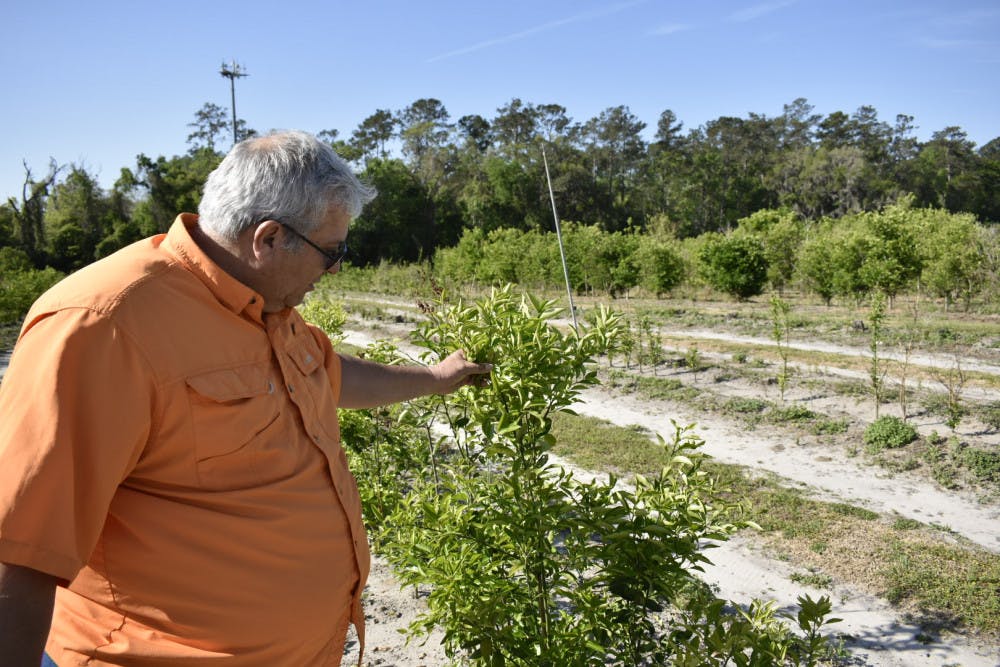Ben Nichols expected to research seedless mandarins for another year. Instead, he’ll be forced to wrap up his studies in three months.
The 32-year-old UF horticultural sciences graduate student and other researchers are gathering as much data as they can from the orange, peach, grapefruit, apricot and avocado trees at UF’s Horticultural Sciences Fruit and Teaching Orchard off of Hull Road before the bulldozers arrive in the Fall.
“I’m under a time crunch now,” he said.
Almost 1,000 trees will need to be propagated to make room for a new baseball stadium. The process of propagation, which is cloning a plant from its leaf or stem cuttings to re-plant, will delay research by two years, said José Chaparro, a UF associate professor studying fruit tree breeding and genetics.
The trees are used to find commercially viable alternatives to Florida oranges, said Chaparro, who has worked in the more than 13-acre orchard since 2004.
Chaparro said this research is essential for Florida citrus, which is currently at-risk from citrus greening, which has claimed more than $7.8 billion in revenue since its discovery in 2005, according to UF/IFAS studies.
“We’re down to the production levels of the 1940s,” he said.
He said the move to a new plot will result in a net loss of about 6 acres but will all be worth it when UF/IFAS cashes a $3 million payment from the University Athletic Association for the property. He said the money will go toward relocating the current experiments south of the orchard, rebuilding a greenhouse and modernizing the irrigation system.
“Probably (in) three years, when we look back, we’ll think it was all worthwhile,” Chaparro said.
UAA will pay UF/IFAS $3 million over the next five years to build a $50 million ballpark, which was approved by the UF Board of Trustees in a meeting last Friday, according to Alligator archives.
The stadium will be built by 2020, and it will address the current stadium’s concerns with shading, UF Athletic Director Scott Stricklin said in the meeting. Its home plate will face northeast, away from the shining sun in the afternoon, and a 360-degree pathway around the stadium will provide a more engaging fan experience, Stricklin said.
Kevin Heinicka, the director of IFAS Facilities Planning and Operations, helped negotiate the land transfer with UAA and said funding will also go toward renovating office spaces and educational research facilities off Hull Road, across from Fifield Hall.
“It will offer an enhanced research and teaching experience for students,” Heinicka said.
Heinicka said the teaching orchard is the last on-campus space for farming, aside from greenhouses, so preserving it for horticulture students is a top priority. He said the aim was to keep the trees on campus instead of moving them to Citra, Florida, where other citrus research is already taking place.
“You can’t relocate the students 30 minutes away to effectively teach a class,” he said.
The pale white office buildings, some of which are more than 50 years old, will be renovated to be more visually appealing and professional-looking, Heinicka said.
Thomas Fraleigh, a UF plant science and political science senior, said although research is being set back, upgrading older-looking buildings and improving technology will be better for the program in the long run.
“In some ways it’s a part of campus people forget about,” the 21-year-old said. “Overall, the benefits might help to revitalize the area.”
Contact Elliott Nasby at enasby@alligator.org. Follow him on Twitter at @_ElohEl.
José Chaparro, an associate horticultural sciences professor who’s been breeding fruit varieties at UF since 2004, checks on a citrus plant variety bred with genes to make it more freeze-resistant.






